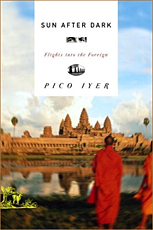"The physical aspect of travel is, for me, the least interesting; what really draws me is the prospect of stepping out of the daylight of everything I know, into the shadows of what I don't know, and may never know. Confronted by the foreign, we grow newly attentive to the details of the world, even as we make out sometimes, the larger outline that lies behind them," writes Pico Iyer in this alluring collection of essays. Without the drama of travel, his senses dull and the world seems too small and confining. Iyer's imagination creates wide spaces. A connoisseur of the commonplace, he is able to find the exotic in the familiar and to appreciate the faraway places that are out of sight and out of mind for most of us.
In this beautifully written book, Iyer (Abandon, The Global Soul) visits some of the poorest countries in the world including Haiti, Ethiopia, and Cambodia. He is following the lead of fellow writer Susan Sontag: "I will visit a place entirely other than myself, whether it is the future or the past need not be decided in advance." Mystery abounds in Bali where there are 30,000 temples in a space not much larger than a major city. Dread encompasses us as we join Iyer and his mother on a visit to Angkor where 2.6 million land mines remain unexcavated. Isn't it time that the war profiteers and arms dealers were assigned the task of clearing them out and all those in other places as well?
Iyer catches up with Leonard Cohen in a monastery outside Los Angeles and admires the fact that the singer/songwriter has "never chosen to diversify his themes; he just goes deeper and deeper into them." He spends some time with the Dalai Lama, whom he finds has a talent for listening. He concludes that the real heart of the Tibetan leader exists in silence. Thanks to his high regard for the "other," Iyer always manages to nudge us into a deeper appreciation for the mysteries and the wonders of the world.
